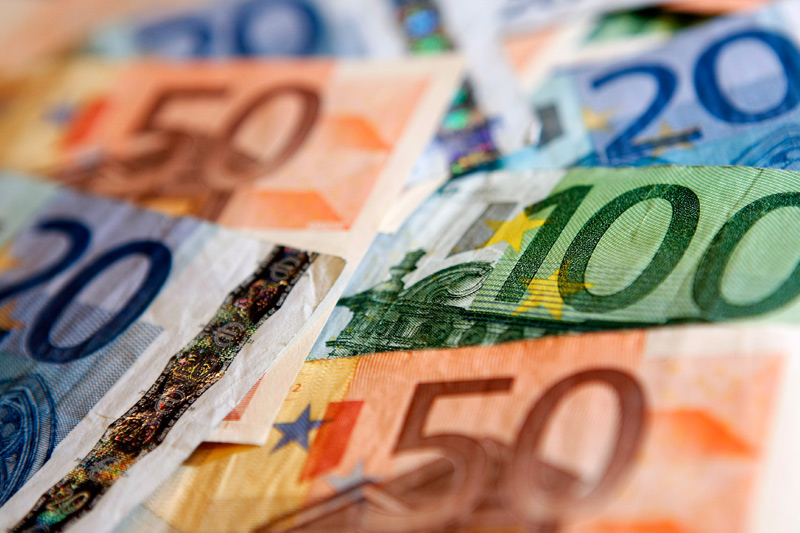Investing.com - The euro extended losses against the U.S. dollar and the yen on Wednesday, after Italy saw borrowing costs rise sharply at an auction of government debt, adding to fears that the debt crisis in the euro zone is worsening.
During European late morning trade, the euro fell to a near two-year low against the U.S. dollar, with EUR/USD shedding 0.51% to hit 1.2438.
Italy’s Treasury sold EUR3.39 billion worth of five-year government bonds at an average yield of 5.66%, the highest since December and up from 4.86% at a similar auction last month.
Italy also sold EUR2.34 billion of 10-year debt at an average yield of 6.03%, the highest since January and up from 5.66% at a similar auction in April.
Demand for the debt also weakened, indicating that concerns over Spain and uncertainty over the outcome of elections in Greece next month are having a negative impact on Italy.
The euro has come under heavy selling pressure amid concerns over the situation in Spain, where rising bond yields, the growing costs of bank rescues and a recession hit economy fuelled fears that Madrid will be forced to seek an international bailout.
The yield on Spanish 10-year bonds climbed to 6.54% earlier Wednesday, approaching the critical 7% threshold that preceded bailouts in Greece, Ireland and Portugal.
Elsewhere, the single currency fell to a four-month low against the yen, with EUR/JPY tumbling 1.00% to hit 98.39.
The yen found support after Bank of Japan policymakers signaled that Japan is likely to meet its 1% inflation target without further monetary easing, but they did not rule out the possibility of fresh stimulus if the ongoing crisis in the euro zone exerted strong downward pressure on Japan’s economy.
The euro inched lower against the pound, with EUR/GBP dipping 0.06% to hit 0.7987 but remained steady against the Swiss franc, with EUR/CHF inching up 0.01% to hit 1.2010.
In the U.K., official data showed that net lending to individuals ticked higher in April, rising by GBP1.4 billion, slightly above expectations for a GBP1.2 billion increase.
A separate report showed that U.K. mortgage approvals also edged higher last month.
The euro was marginally higher against the Canadian, Australian and New Zealand dollars, with EUR/CAD easing up 0.06% to hit 1.2784, EUR/AUD rising 0.31% to hit 1.2734 and EUR/NZD adding 0.12% to hit 1.6410.
The Aussie weakened earlier after government data showed that retail sales fell unexpectedly in April, ticking down 0.2% after a 1.1% increase the previous month.
Later Wednesday, European Central Bank President Mario Draghi was to speak, while the U.S. was to release a report on pending home sales.
During European late morning trade, the euro fell to a near two-year low against the U.S. dollar, with EUR/USD shedding 0.51% to hit 1.2438.
Italy’s Treasury sold EUR3.39 billion worth of five-year government bonds at an average yield of 5.66%, the highest since December and up from 4.86% at a similar auction last month.
Italy also sold EUR2.34 billion of 10-year debt at an average yield of 6.03%, the highest since January and up from 5.66% at a similar auction in April.
Demand for the debt also weakened, indicating that concerns over Spain and uncertainty over the outcome of elections in Greece next month are having a negative impact on Italy.
The euro has come under heavy selling pressure amid concerns over the situation in Spain, where rising bond yields, the growing costs of bank rescues and a recession hit economy fuelled fears that Madrid will be forced to seek an international bailout.
The yield on Spanish 10-year bonds climbed to 6.54% earlier Wednesday, approaching the critical 7% threshold that preceded bailouts in Greece, Ireland and Portugal.
Elsewhere, the single currency fell to a four-month low against the yen, with EUR/JPY tumbling 1.00% to hit 98.39.
The yen found support after Bank of Japan policymakers signaled that Japan is likely to meet its 1% inflation target without further monetary easing, but they did not rule out the possibility of fresh stimulus if the ongoing crisis in the euro zone exerted strong downward pressure on Japan’s economy.
The euro inched lower against the pound, with EUR/GBP dipping 0.06% to hit 0.7987 but remained steady against the Swiss franc, with EUR/CHF inching up 0.01% to hit 1.2010.
In the U.K., official data showed that net lending to individuals ticked higher in April, rising by GBP1.4 billion, slightly above expectations for a GBP1.2 billion increase.
A separate report showed that U.K. mortgage approvals also edged higher last month.
The euro was marginally higher against the Canadian, Australian and New Zealand dollars, with EUR/CAD easing up 0.06% to hit 1.2784, EUR/AUD rising 0.31% to hit 1.2734 and EUR/NZD adding 0.12% to hit 1.6410.
The Aussie weakened earlier after government data showed that retail sales fell unexpectedly in April, ticking down 0.2% after a 1.1% increase the previous month.
Later Wednesday, European Central Bank President Mario Draghi was to speak, while the U.S. was to release a report on pending home sales.
